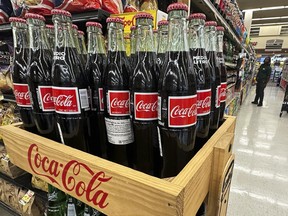World
Coca-Cola’s Cane Sugar Rollout: No Plans for Canadian Consumers

Coca-Cola has begun introducing a new cane sugar version of its iconic beverage in the United States, but Canadian consumers will not have access to this option. This decision follows a public push from former President Donald Trump, who advocated for the return of cane sugar in Coca-Cola’s formulation. Despite the excitement around this launch, Canadians will continue to find high-fructose corn syrup (HFCS) in their Coke, which is labeled as “Sugar (glucose-fructose)” in Canada, misleading many into thinking it is cane sugar.
The shift towards cane sugar in the United States is seen as a marketing strategy that taps into consumer nostalgia. Coca-Cola has historically leveraged such emotional connections in its advertising campaigns. According to Eran Mizrahi, CEO and cofounder of Source86, the move caters to two significant consumer trends: nostalgia and a desire for perceived healthier options. He noted that today’s consumers seek authenticity and simplicity in their food and beverage choices.
Prominent brand reputation management expert Baruch Labunski also highlights that the emotional ties to “real sugar” influence purchasing decisions, particularly among millennials and Generation Z. They prefer products that evoke memories of simpler times and want to feel they are choosing a “cleaner” option. Coca-Cola is not alone in this approach; Pepsi has also launched a cane sugar version of its cola, reflecting a broader trend among beverage companies to integrate more natural sweeteners.
Despite the push for cane sugar, the debate over health implications continues. In a January 2024 appearance, Robert F. Kennedy Jr., now the Health and Human Services Secretary, criticized HFCS, claiming it is linked to rising obesity and diabetes rates. However, food scientists argue the metabolic differences between cane sugar and HFCS are minimal. Bryan Quoc Le, founder of Mendocino Food Consulting, asserts both sugars ultimately deliver similar glucose and fructose to the body, and that the prevalence of HFCS in products is more about its cost-effectiveness than its health effects.
The limited rollout of the cane sugar Coca-Cola in the United States means that supply chain issues may arise. The majority of American cane sugar is produced in just three states: Florida, Louisiana, and Texas. In contrast, corn, the primary source of HFCS, can be grown in many regions across the country, making it a more readily available sweetener. As demand for cane sugar increases, prices are likely to rise due to limited supply.
Currently, there are no plans for Coca-Cola to bring its cane sugar product to Canada. As a result, Canadian consumers will continue to rely on HFCS-containing beverages or opt for the more expensive Mexican version, which is made with cane sugar. Interestingly, a report from the Conference Board of Canada indicates a trend among Canadian consumers favoring low-calorie non-alcoholic beverages, which comprised nearly 60 percent of beverage purchases in 2021, up from 44 percent in 2009.
While many Canadians may prefer diet drinks, the ongoing debate around sweeteners continues to influence consumer choices. As Coca-Cola navigates this new chapter in its product offerings, the distinction between cane sugar and HFCS will remain a significant topic in discussions about health, nostalgia, and consumer preferences.
-

 Science3 months ago
Science3 months agoToyoake City Proposes Daily Two-Hour Smartphone Use Limit
-

 Top Stories3 months ago
Top Stories3 months agoPedestrian Fatally Injured in Esquimalt Collision on August 14
-

 Health3 months ago
Health3 months agoB.C. Review Reveals Urgent Need for Rare-Disease Drug Reforms
-

 Technology3 months ago
Technology3 months agoDark Adventure Game “Bye Sweet Carole” Set for October Release
-

 World3 months ago
World3 months agoJimmy Lai’s Defense Challenges Charges Under National Security Law
-

 Lifestyle3 months ago
Lifestyle3 months agoVictoria’s Pop-Up Shop Shines Light on B.C.’s Wolf Cull
-

 Technology3 months ago
Technology3 months agoKonami Revives Iconic Metal Gear Solid Delta Ahead of Release
-

 Technology3 months ago
Technology3 months agoApple Expands Self-Service Repair Program to Canada
-

 Technology3 months ago
Technology3 months agoSnapmaker U1 Color 3D Printer Redefines Speed and Sustainability
-

 Technology3 months ago
Technology3 months agoAION Folding Knife: Redefining EDC Design with Premium Materials
-

 Business3 months ago
Business3 months agoGordon Murray Automotive Unveils S1 LM and Le Mans GTR at Monterey
-

 Technology3 months ago
Technology3 months agoSolve Today’s Wordle Challenge: Hints and Answer for August 19









